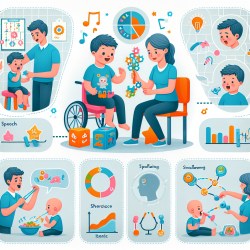Diarrhea remains a significant public health challenge in sub-Saharan Africa, especially among children under five. Recent research titled Diarrhea as a Disease of Poverty Among Under-Five Children in Sub-Saharan Africa: A Cross-Sectional Study sheds light on the prevalence and sociodemographic factors associated with this condition. For practitioners working with children, understanding these findings can be instrumental in improving care and advocating for necessary interventions.
Key Findings from the Research
The study analyzed data from 36 countries in sub-Saharan Africa and found that the overall prevalence of diarrhea among under-five children was 18.44%. Boys were more affected than girls, with 19.12% of boys and 17.75% of girls experiencing diarrhea in the two weeks preceding the survey.
Socioeconomic Factors
- Children from wealthier households had a lower risk of diarrhea.
- Rural residency was associated with a slightly lower risk compared to urban areas.
- Lack of access to improved water and toilet facilities significantly increased the risk.
Child and Maternal Factors
- Higher birth order and younger age groups were linked to a higher risk of diarrhea.
- Children with mothers who had higher education levels faced lower risks.
- Female children were less likely to suffer from diarrhea compared to male children.
Practical Implications for Practitioners
Practitioners can leverage these findings to enhance their strategies and interventions:
Promote Hygiene Education
Encourage families to adopt better hygiene practices. Simple measures such as handwashing with soap, using clean water, and maintaining sanitary toilet facilities can drastically reduce the incidence of diarrhea.
Advocate for Improved Facilities
Work with local authorities and organizations to improve access to clean water and sanitation facilities. These infrastructural changes can have a long-term impact on reducing diarrhea cases.
Targeted Interventions
Focus on vulnerable groups such as children from poorer households, those with lower maternal education levels, and those of higher birth order. Tailored interventions can address specific needs and mitigate risk factors more effectively.
Support Maternal Education
Encourage and support initiatives that aim to improve maternal education. Educated mothers are more likely to adopt and promote healthful practices that can protect their children from diarrhea and other illnesses.
Encouraging Further Research
The findings from this study underscore the importance of ongoing research. Practitioners should stay informed about the latest research developments and consider participating in studies that aim to uncover more about the sociodemographic determinants of diarrhea. By doing so, they can contribute to a broader understanding and more effective interventions.
To read the original research paper, please follow this link: Diarrhea as a Disease of Poverty Among Under-Five Children in Sub-Saharan Africa: A Cross-Sectional Study.










